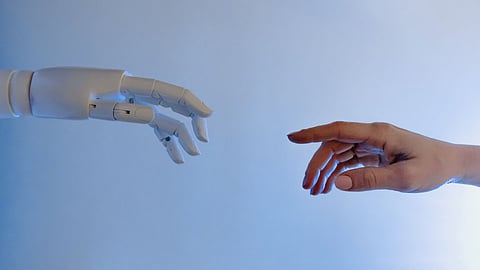
- LIFESTYLE
- FASHION
- FOOD
- ENTERTAINMENT
- EVENTS
- CULTURE
- VIDEOS
- WEB STORIES
- GALLERIES
- GADGETS
- CAR & BIKE
- SOCIETY
- TRAVEL
- NORTH EAST
- INDULGE CONNECT

On National Creativity Day, the spotlight naturally turns to artists, designers, writers, and innovators and, increasingly, the tools they use.
If AI can do it all (or so we think), what can we do? Even Tesla CEO Elon Musk has shared concern about the power AI wields.
But we can still use AI ethically, without letting it take over entirely.
We get it. AI helps us when we face creative blocks and tight deadlines. But we cannot let it solve everything for us. It doesn't do our work any justice. Our audience deserves better.
AI is best when used as a thought partner, not the artist itself. If you hand over the entire creative process to a machine, you may find your work becoming derivative and repetitive, not to mention those infinite em dashes. Try to reword your piece. Recheck your narrative.
Is AI telling your story or is it refining your story?
Here’s a mindset shift: AI is your intern, not your boss. It doesn’t have to replace your vision.
When you’re trying to win over a client or land a bold campaign idea, AI can be the quick-thinking junior that helps you test concepts, pull references, or explore directions. But the win is on you.
In the agency world, for instance, this distinction is key. AI might help you scale, but your currency is originality. Used well, it can help you write killer copy, brainstorm visuals, and land the deal. It's up to you to leave or emit that Oxford comma before the last example in any sentence.
Yes, AI can “outwrite” you on a good day. It can stitch together poems, paint portraits, and design logos in seconds. But AI was trained on human inputs.
Stop trying to make your work perfect. Leave some imperfections in. Not deliberately. Just so, the commas don't always line up and the sentence is phrased awkwardly enough for your audience to know that it was, in fact, written by a human.
Yes, it is sad that we have to stop perfecting our work, but we're trying to excel, not perfect it.
So, keep drawing. Keep designing. Keep writing.
The fear that AI will "replace" creativity stems mostly from misunderstanding it. When used right, you are the one guiding AI, not the other way around. If you feed it thoughtful prompts, ask the right questions, and layer your perspective into the output, the end result will always be uniquely yours.
No matter what AI spits out, you hold the red pen. You make the final decision. You decide what stays, what changes, and what makes it out into the world.
Whatever our future holds, we need to stay optimistic and keep at whatever it is that we're creating.